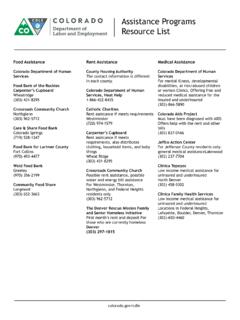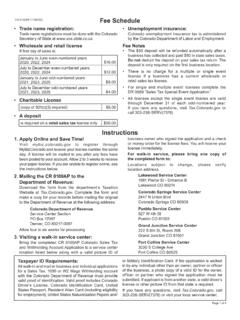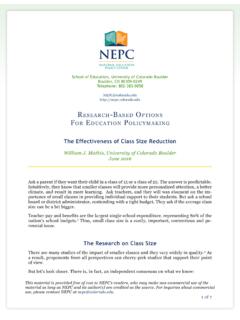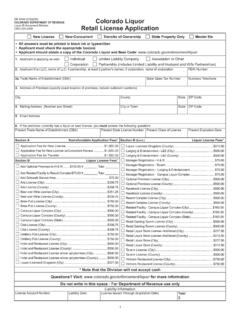Transcription of LAW SUMMARY - Colorado
1 Colorado open Records Act - "CORA" 1 What is a public record ? The definition of "public records" found in CORA is quite expansive and applies to virtually all levels and types of governments in Colorado , except for the federal government and tribal governments. It includes all writings, books, papers, photographs, tape recordings, and electronic mail made, maintained, or kept by the state, any agency, institution, or political subdivision of the state, and any elected or appointed public official for use in the exercise of functions required or authorized by law or involving the receipt or expenditure of public funds. There are some exceptions, including communications that are personal in nature, confidential messages from constituents about a matter relating to that constituent, and work product, including documents relating to the drafting of bills.
2 However, as a general rule, any person who may be subject to the open records law should err on the side of considering all communications to be potentially releasable, including records kept on a personally owned, private device. Who may request inspection of a public record ? CORA says that "any person" may inspect public records. "Person" includes any natural person, as well as corporations, limited liability companies, partnerships, and associations. Who is a "custodian" of a public record ? CORA broadly defines a "custodian" as the official custodian or any authorized person who has personal custody and control of a public record . Depending on the record in question, the custodian may be a defined person or a government agency or department.
3 For the General Assembly, each legislator is the custodian of the legislator's own records. Each legislative staff member is the custodian of the staff member's own records, except for the nonpartisan staff of the following legislative branch agencies: The Joint Budget Committee, Legislative Council, Office of Legislative Legal Services, Office of the State Auditor, Colorado House of Representatives, and Colorado Senate. 1 This SUMMARY contains information commonly requested from the Office of Legislative Legal Services. It does not represent an official legal opinion of the General Assembly or the state of Colorado and does not bind the members of the General Assembly.
4 It is intended to provide a general overview of Colorado law as of the date of its preparation. Any person needing legal advice should consult his or her own lawyer and should not rely on the information in this memorandum. LAW SUMMARY Office of Legislative Legal Services Page 2 of 4 How long does a custodian of a public record have to make it available for inspection? CORA mandates a quick turnaround time for records requests. The law says that records must be made available for inspection within three business days after receipt of the request. This three-day period can be extended for an additional seven days in cases of extenuating circumstances, such as when a request to a legislator arrives during the legislative session.
5 When may inspection of a public record be denied? A custodian of a public record must allow the inspection of the record unless a specific ground for denial set out in CORA exists. These include cases where the inspection would be contrary to state or federal statute or federal regulation or is prohibited by court order. Certain records may be kept from inspection on the ground that disclosure would be contrary to the public interest. These include records of investigative files kept by law enforcement and others, licensing examinations scores, and electronic mail addresses, telephone numbers, or home addresses provided by a person to an elected official, state agency, or political subdivision.
6 Please see the attached table reflecting CORA's exceptions, exemptions, and extensions. May a custodian of a public record charge a fee for inspection of the record ? A custodian may charge a fee of not more than $ per standard page for a printed copy of a public record or a fee of not more than the actual cost of providing a copy, printout, or photograph of the record in a format other than a standard page. A custodian shall not charge a per-page fee for providing records in a digital or electronic format. If a fee for a certified copy or other copy of a record is specifically established in law, the specific fee applies. No transmission fee may be charged for transmitting public records via electronic mail.
7 If the custodian has posted on the custodian's website, or otherwise published, a written policy that specifies the conditions related to the research and retrieval of public records by the custodian, including the amount of any fees, the custodian may charge a nominal fee per hour for research and retrieval time after the first hour. Before completing a request that will take more than one hour of research and retrieval time, the custodian may require the requestor to pay a deposit equal to the estimated staff time needed to comply with the request. If the actual time spent turns out to be more or less than the initial estimate, the custodian may require an additional payment or make a partial refund of the deposit, respectively.
8 If a custodian allows members of the public to pay for any other service or product provided by the custodian with a credit card or electronic payment, the custodian must allow a requester of public records to pay any fee or deposit associated with the open records request with a credit card or via an electronic payment. The custodian may require a Page 3 of 4 requester to pay any service charge or fee imposed by the processor of a credit card or electronic payment. How long must a custodian maintain a public record , including electronic mail? CORA does not contain a specific requirement regarding the length of time a custodian must maintain a public record .
9 Custodians and agencies can make their own determination of the appropriate length of time a record must be kept or archived. For example, the policy adopted by the Colorado General Assembly recommends the deletion of electronic mail messages within 30 days in most circumstances. On or before January 1, 2024, each member of the General Assembly, the governor s office and each office of the governor, and each state agency and institution is required to submit a report to the staff of the Legislative Council of the General Assembly outlining its respective electronic mail retention policy. The members of the General Assembly are permitted to submit individual reports or may submit a report that specifies the electronic mail retention policies of multiple members of the General Assembly.
10 What is the penalty for violating CORA? If a court determines that a custodian of a public record has improperly denied the right of inspection of a public record under CORA, the court must award court costs and reasonable attorney fees to the prevailing party. Section 24-72 -206, , formerly specified a misdemeanor penalty - punishable by a fine of not more than $100, imprisonment in county jail for not more than 90 days, or both - for willfully and knowingly violating CORA. But that statutory provision was repealed in 2017. How can the General Assembly's CORA policies be accessed? The General Assembly s policies related to public records and email can be found at: LAST REVISED: 12/04/2023 S:\Public\Lls\MEMOS\Law Summaries\ CORA Common Exceptions, Exclusions, & Extensions Correspondence: CORA excludes the correspondence of elected officials from the definition of "public records" to the extent that such correspondence is: Exclusions from the definition of "public records": CORA specifically excludes the following [Section 24 -72 -202 (6)(b), ]: Exceptions to Inspection - Custodian's Discretion.















